|
Muzzle Blasts Online |
|
...for the muzzleloading enthusiast |
|
The muzzleblasts.com domain, subdomains, content, etc., are neither affiliated with the NMLRA nor its paper magazine Muzzle Blasts |
|
Muzzle Blasts Online |
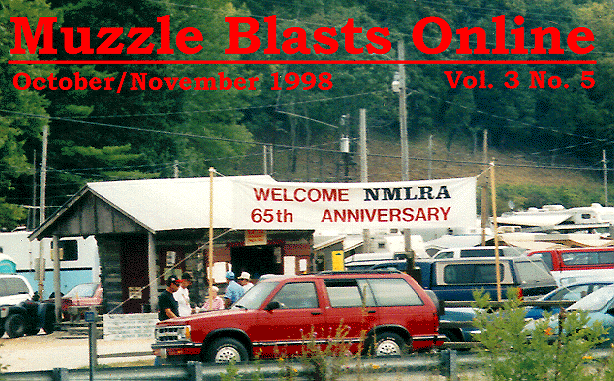
|
|
|
|
|
|
The Natchez Trace; Part II
| Our camp (was) surprised in the night, and two of our horses stolen by the Indians. |
| Bailey, Founder and President of the Royal Astronomical Society of Great Britain, from his Journal of a Tour in Unsettled Parts of North America, 1797. |
In the first episode of our story, you were taken back to the turn of the Nineteenth Century as a member of a flatboat crew (called Kaintucks in that period) who were returning home overland via the Natchez Trace. Five days out of Natchez, Monroe Miller, the youngest member of the crew, is stricken with yellow fever. The rest of the crew, apprehensive that they may catch the fever from Monroe, have left you horses, provisions, and their best wishes and have moved on. As our story paused, a highwayman posing as a preacher now holds you at pistol point and seems intent on hastening both you and Monroe to your eternal reward.
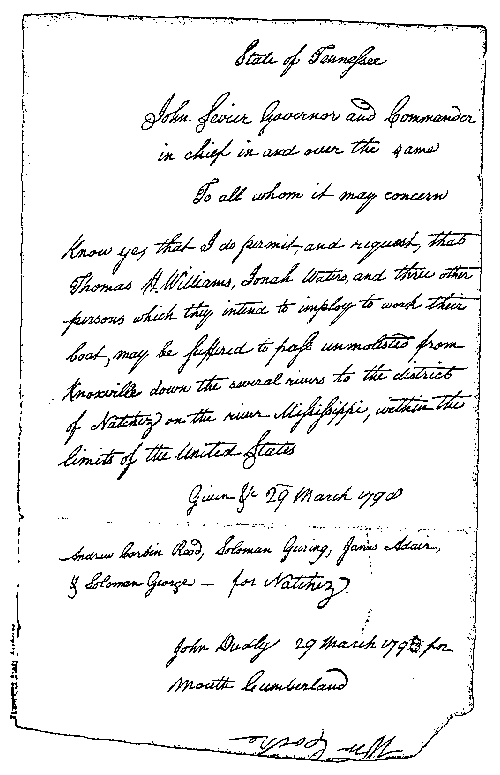
|
|
A copy of a passport issued by the State of Tennessee to boatmen transporting goods to Natchez. (Reference 4, Part I) |
A bright crackling light shines through what seems to be a brown haze. A shadow screens the light from view, and through the haze and the pounding of your head, you hear the voice of Lewis Jones. "Er ye decidin' to stay in the land of the livin', Ol' Hoss?" Without allowing you an answer, he continues "We thought them blaggards had kilt ya too, when we first found ya, but it looks like ya tried to do that job yourself - run into a big ol' overhangin' limb and knocked you own self out, I reckon." He continues "You prob'ly wonderin' why Giles n' I's playin' guardian angel fur ye. Well, we passed that ol' black-coated buzzard and two other fellers way up the Trace. After they passed, somethin' kept ticklin' my brain, a-sayin' I'd seen them three fellers afore, when I knowed I hadn't. Then it hit me. Our last night in Natchez, I spent some time with that lil' yaller tart, remember, the one with the ring in her nose? Wal, anyway, she was a-tellin' me 'bout one o' her other customers, how he was braggin' how he was the sole survivin' victim of this ol' owlhoot posin' as a preacher. Him an' his two sons shot an' knifed this here feller and rolled him into a crick, but he warn't quite dead, so he was found 'n patched up to live ta tell tha tale. An' I was thinkin' how that no-good bunch wouldn't try nothin' with us, bein' so many and so well armed an' all. An' all the time, it was you and Monroe I should 'a' been worryin' about. So I grabbed Brother Giles out and we came high-tailin' it back; I guess we was a-feelin' guilty about leavin' ya'll here in the first place. Anyway, we come up, our hosses all lathered up 'n huffin' like they was goin' into heaves, an' we seed them two varmints here in camp and they must 'a' knowed that we was on to their dirty game. We had a lively lil' shoot-out right here, but they was only carryin' pistols, an' didn't seem used to shootin' fellars from the front nohow. The lil' one with the red beard is stretched out o'er thar deader 'n a doornail. T'other looked gut-shot, the way he was huggin' down over his hoss. He got away 'cause we was more troubled about you and Monroe than that varmint, but I reckon he's hit hard and won't git fur. We're expectin' ol' Papa Buzzard to come back sneakin' round, so Giles is off a ways out thar in the brush a-watchin' out fur im. He got his Brown Bess loaded with swan shot. If we kin come outa this no worsen' we are, we'll do alright. We got lil' Red Beard's pistols, two fine hosses, an' a nice pack mule an' a bunch o' booty that them owlhoots must 'a' lifted offen somebody. They'll be somethin' to give to Monroe's mama. Monroe's ol' man is dead, 'n' she still got two half-pints at home. Monroe was a fine young fellar, 'n' maybe them li'l'uns will grow up to be jist like him." His voice trails off "Hoss, I'm a-tellin' ya, Monroe's dead 'n thar's nuthin' you or anybody else, short o' th'Almighty hisself, could 'a' done fur him. But fur you..." his voice brightens, "we need ta git that punkin head sewed up 'cause it looks like hit's ready to split wide open in front. Now, Giles here's a expert with a surgical needle an' catgut. Why, when my little white mule got bit by a ol' copperhead a couple o' y'ars ago, she swoll up from hock ta flank like a summer sausage. Atter about three days, she come out with a big ol' corruption-filled knot on her leg an' everbody sad she'd be a-takin' blood p'ison an' die. Well, Giles, he just had me an' my boys sling her up again' the side o' the stall real tight, an' he lanced that thing n' sewed her up, an' now she's good in the harness as any mule in Davidson County. He kin do the same fur you, if he can do it at first light, afore the edges o' that split git ta growin' down inta the meat and formin' a scar."
The white mule story, the prospect of a farmer sewing up your wound, and the pain enveloping your whole head send your mercifully back into a spinning swoon.
After a fitful night of pain from your throbbing head, the sorrow of Monroe's death, and the anxiety of the bandits' possible return, you feel relieved when the chirping of the birds signals the pre-dawn of a new day. Your two comrades are nowhere to be seen, but the still form of Monroe Miller lies serenely wrapped in his blanket. Getting up to relieve yourself is a chore indeed, but the pain seems to be more on the surface now, reminding you of the prospect of getting sewn up this morning.
A slight rustle behind you causes you to whirl, but it's only Giles. The sudden movement causes the dull pain to throb and your knees seem to want to buckle. Giles murmurs, "Lewis took over guard duty so's I kin git ya re-paired. Now Pap always said when he was a-fixin' up us kids from our scrapes, that a sew-up job takes a equal 'mount of whiskey on th'outside to wash tha wound an' on th'inside ta build courage in tha payshum. Pap wouldn't let us kids drink, so he took keer o' the inside part on himself instead. We ain't got no good Nashville Red Heifer whiskey with us, so this lil' flask o' French brandy I brung frum Natchez will haf to do. I got water b'ilin', so take a good shot o' brandy now and we'll jist git that cake o' ooze washed off ya haid." The burning of the brandy in your gut coupled with the burning of the brandy dribbled down into the raw flesh of the split in your forehead are heaven-sent distractions that make the three stitches seem less painful than anticipated.
Throughout the morning, Lewis and Giles busy themselves with burying Monroe and carving a marker for his gravesite from a large shake split out of a section of downed oak. That accomplished, they turn to the matter of what to do with Jacob's body. Lewis wants to load the body onto one of the spare horses and take it to the first semblance of law up the Trace. Giles insists on hanging the body from one of the big oaks arching over the track as a warning to other miscreants that the vengeance of the Kaintucks can be swift and final. "If'n the law want 'im, let 'em come an' git 'im." Giles adds with finality, "Ain't so sense kerrying a bloatin' owlhoot fur who knows how miny day. Lookee, Lewis, I'l make up a placard fur 'im myself, a-saying jist who 'e is an' what 'e done, fur all ta see." Lewis nods and agrees "Weel, let's git doin' hit, we ain't got all day jawin' over this h'ar lump o' rotten meat!" You are relieved to be passed over in both the decision and in assisting with the grisly task. Finally, with the noonday sun dappling the Trace, the three of you start the trek north again. As you turn to leave the campsite, you glance back down the Trace. Jacob Roan's grotesquely stiffened body turns slowly back and forth under the twisting and untwisting of the hemp rope that suspends him from a branch overhanging the track. (Author' note. Bandits, like rebellious slaves, were treated harshly when brought to local justice along the Trace, and hangings, beheading, and branding were common punishments5.)
This afternoon is a long one, as there is a good bit of distance to cover to catch up with the rest of the party. Every little misstep of your horse on the rough, root-infested track reminds you that your head is swollen and sore under the bandage. Late in the evening, an open meadow breaks the gloom of the forest track and the Kaintucks' camp comes into view. Two large fires are blazing brightly, and the welcome sound of familiar voices can be heard. There is much relief among your companions at your safe (if painful) return, but the mood is tempered with the knowledge that Monroe Miller's body will always rest in a lonely gravesite just off the Trace.
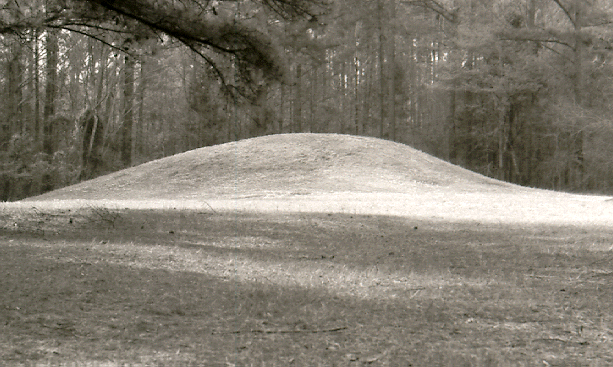
|
|
Mounds were common reminders of the extinct native civilizations which once clustered along the Natchez Trace. |
Next morning dawns dull, gray and sullen, and a light mist begins to fall. By noon it is a steady drizzle that soaks everything on man and beast. The Trace is becoming a quagmire of red clay that sucks at your every step. At many locations, the Trace separates into several tracks, and disputes sometimes break out among the boatmen as to which one to take. Inevitably, no matter which opinion prevails, and no matter which track is chosen at a particular location, there are difficult sections that bring out complaints and second guesses by those whose opinions were overruled. By day's end, everyone is near complete exhaustion, but there is little area along the Trace that is welcoming enough to be considered a suitable campsite. Finally, a slight rise is reached where there is a tangle of downed timber that has suffered a tornado by the looks of the devastation. Camp is made rapidly in the gathering dusk of the evening, and despite the abundance of dead wood, no one seems inclined to light a fire or cook a proper meal. It is your turn to stand first watch tonight. The waxing moon has reached its second quarter and rises through the clear sky to illuminate the silhouettes of the tangled stretch of downed trees. To keep yourself awake, you pass the time counting limbs and snags. When Willis comes to relieve you of watch duty, sleep sweeps over you like a warm wave.
"Hoss, don't move a muscle, not even your little toenail" Lewis' voice wakens you gently to the dampness of the foggy morning. Through bleary eyes, your first view of the new day is filled by the grim stare of a big diamondback rattler tightly coiled only a foot from your face. The world explodes into smoke and sparks as a blast from Lewis' scattergun blows the big rattler into a writhing, headless mass. Above the ringing in your ears, you hear Lewis holler "Hey, boys, anybody want half a snake fur brekfist? Ye ain't gonna git no swamp turkey this mornin' 'cuz I dun blowed my bird load skinnin' im fur ye!" While the men stretch out what is left of the big rattler for a measurement, you snuff out the sparks that are smoldering and making black holes in your blanket.
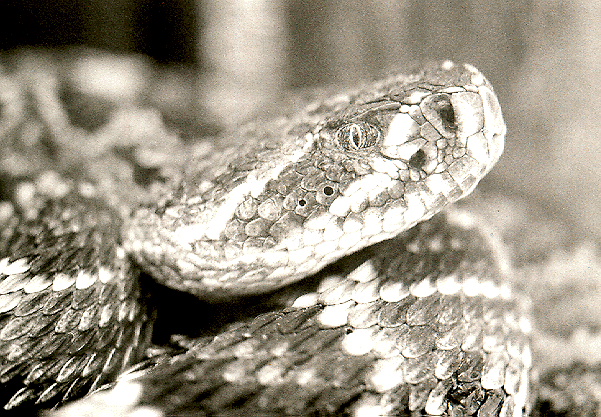
|
|
Awakening to the cold stare of a big rattlesnake is a bad way to start a new day. |
One of the boatmen speaks up from the rear of the party: "Lootenint, if'n ya want ta build this h'ar mud track inta a national road, we're all fur that -- but ya may want ta take your crew back down the Trace a couple o' days' ride. We got a swamp down thar where ya wouldn't have ta cut any trees -- jist build a corduroy o' alligators, use 'em rattlesnakes an' cottonmouths fur cross ties, chink up tha holes with skeeters, and stick the whole mess togither with swamp slime."
The boatmen guffaw heartily at the wry humor, but the lieutenant makes only a non-committal smile: "Well, gentlemen, we'll do the best we can with what we've got. Best to pass on through now while my men take a break. On up the Trace, keep an eye on your horses because Tishomingo and his Chickasaws have a lot of practice with midnight requisition. Your best insurance against making the rest of your trek on foot would be posting alert sentries and keeping well-primed pans each and every night." Christopher nods, thanks the officer, and leads a somewhat sobered group past the surveying crew and up the track.
The Trace now laces its worn path back and forth between forest and rolling meadows, some marked with the now-familiar grassy mounds built by ancient people who came and left centuries before. The army's construction and clearing on this part of the Trace is much in evidence. Along this section of America's first national road, the track is wide and easily negotiable, so that two wagons could pass each other without difficulty.
The first image of autumn is becoming apparent in the sourwoods with their vivid scarlet, and in the oaks with their flecks of gold among the green. The gradual change in latitude, together with the rise in elevation, is making its effect felt at night also, for toward morning, a light blanket is beginning to feel good. The spirit of the men is generally high, although there are sporadic bouts of dysentery among several members of the party. Not another human soul has been seen on the Trace for two days now, but all the Kaintucks maintain an increased wariness now that you are in Chickasaw country, and even Etienne's fiddle is silent in the evening.
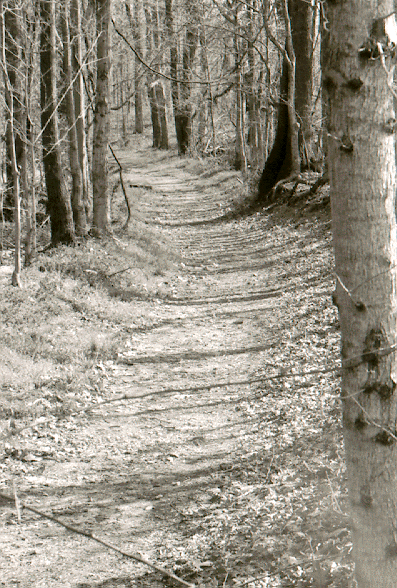
|
|
The stretches of the Trace which were improved by the military crews have remained quite visible to the present day. |
While Christopher is explaining the situation, your gaze is riveted on the lone horseman waiting in the meadow. He does not move, except for the feathers of his horse's mane fluttering lazily in soft autumn breeze. Christopher continues "I reckon they ain't gonna bother us iff'n we jist politely decline his generous offer an' move on up the track. After all, it 'pears we could whup up on 'im an' his boys in a flat-out fight, so 'e ain't gonna bring it to that nohow. I'll go back out, palaver a bit while ya'll move on up the track so ta keep the rest of his boys wondering iff'n we be goin' with 'em to their town 'er jist keepin' on mindin' our own business and expectin' them ta mind thars. What say?" Lewis spoke with an air of finality "Let's do it, boys, an' look good at it. Don't look around ez iff'n yer skirred o' nuthin, but keep yer ears pricked up fur the first sound of a gun cockin' ta the ready!"
As you and the rest of the crew file past Christopher and Marble Eye still gesturing and talking in the middle of the meadow, you cannot help noticing that the left eye of the old Chickasaw is milky white, sightless from what looks like a saber slash that has left a prominent scar from hairline to chin. Considering your recent experience, you can't help but wonder how stoic he was in the treatment, if any, he received for his wound.....
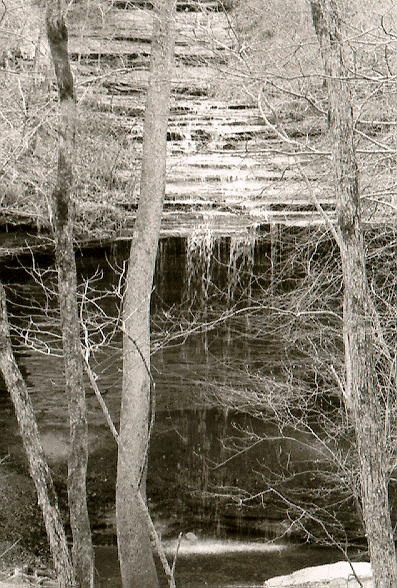
|
|
Waterfalls along the Trace like the one pictured above often provided a cooling respite from the sultry heat of the trail. |
As the night drags by, your mind filters the sounds that are amplified by the descending dampness. They are sounds common and reassuring to the experienced ears of a Kaintuck. The soft hesitant tread of raccoons that purr to each other as they inspect every aspect of the camp. The swooshing snort of a deer as it crosses man scent downwind and bounds off through the shadows. The stricken scream of a rabbit when it feels the fatal, final grasp of fang or talon. Still, nothing unusual, nothing out of place in the mosaic of forest night sounds.
Time drags by. It must be way past midnight now, for the mocking bird is starting his song which signals that the first gray of the dawn is not far off. It is such a relief to doze and let a hundred disconnected thoughts flit past in that corridor between wakefulness and slumber.
A shot rings out from the direction of the horses! Someone is running toward you from the camp. You fling the blanket aside, whirl and rise with cocked pistol in hand, catching your knee in a fold of the blanket as a fleeting body collides with yours. The pistol explodes with a will that seems all its own from the impact. You go down hard on the flat of your back, knocking the breath from your lungs and leaving you gasping and helpless under the body of your assailant.
To be continued.
References
5 Coates, R.M. 1930. The Outlaw Years. The Literary Guild of America, New York.
*Header quote courtesy of the U.S. National Park Service.